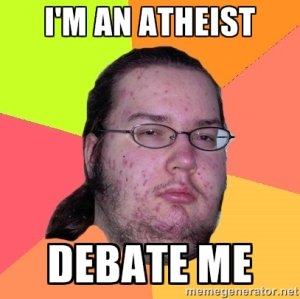What is Atheism? A Socratic Dialogue
Sarah: “I’m an atheist, debate me”? Cute/confrontational shirt, dude.
Brad: Yeah, got it online. Glad you like it.
Sarah: I’m Sarah.
Brad: Brad . . . Aaaaannnnd now I feel awkward ’cause you’re reading the Bible.
Sarah: Haha! Yeah, I come here for a Bible study once a week. It looks like I’ve been stood up.
Brad: Do you mind if I join you?
Sarah: I’m hesitant, given your ridiculous shirt, but sure.
Brad: Thanks. Look what I’m here to read!
Sarah: Wow! Dawkins. How original of you.
Brad: I could say the same about you—The Bible?
Sarah: touché.
. . .
Is this the part where you get all confrontational?
Brad: In it he says . . .
Sarah: I’ve read it.”
Brad: Really?
Sarah: Really. He’s as sophisticated an atheist as Ray Comfort is a Christian.
Brad: Them’s fightin’ words!
Sarah: Maybe I need a similar shirt.
Brad: Do you remember what he said about the God of the Old Testament?
Sarah: Yeah, but I have a hunch you’re gonna to read it to me anyway.
Brad: “The God of the Old Testament is arguably the most unpleasant character in all fiction: jealous and proud of it; a petty, unjust, unforgiving control-freak; a vindictive, bloodthirsty ethnic cleanser; a misogynistic, homophobic, racist, infanticidal, genocidal, filicidal, pestilential, megalomaniacal, sadomasochistic, capriciously malevolent bully.”
Sarah: It’s well written. Why are you an atheist?
Brad: Well, partly because . . . Let’s see here . . . “The God of the Old Testament is arguably the most unpleasant . . .”
Sarah: I get it, I get it.
Brad: You asked.
Sarah: How does that follow though?
Brad: How does what follow?
Sarah: This religion’s account of God is terrible, therefore God does not exist.
Brad: It’s not just that it’s terrible, it’s that it’s contradictory. In the Old Testament he’s a malevolent bully, in the New Testament he’s a peace loving hippie.
Sarah: Well, as formidable as you’re exegetical skills are, so what? Let’s say you’re right. Maybe the Bible is false.
Brad: I’m glad we agree. . . . My Latte’s ready. One sec. . . . Sorry about that. Continue.
Sarah: Seriously? The great atheist debater said yes to sprinkles.
Brad: Hey! Sprinkles are cool, okay? So, what were you saying?
Sarah: I was saying maybe the Bible is false. Obviously I don’t think that, but let’s suppose I’m wrong. How would that prove God doesn’t exist?
Brad: It’s not just the Bible, every formulation of God’s existence from every religion I’ve studied—and I’ve studied a lot!—amounts to nothing more than anthropomorphic twaddle.
Sarah: Okay. Let’s say you’re right. That’s hardly a good reason to think God does not exist. That would be like me saying, “I’ve studied the history of alien abductions. I have interviewed every living claimant, and have found all their stories to be bogus. Therefore aliens do not exist.” Do you see how that’s a non sequitur?
Brad: Sarah, I think it’s important to remember that you’re the one who has the burden of proof here. You’re the one who claims God exists.
Sarah: I agree I have a burden of proof, but so do you, unless you’re not an Atheist after all!
Brad: This is a common misconception. An atheist is not one who says God does not exist, he just lacks belief in the God you claim does.
Sarah: I’m not interested in what you believe.
Brad: Ouch?
Sarah: Look, what I mean is, If you’re going to redefine atheism to mean a “lack of belief,” then what you’re doing is trivializing what has traditionally been meant by “atheism.” This definition of yours would make atheism, not a belief, but a state of mind. And I’m not interested in your state of mind, I’m interested in what’s true.
Brad: It’s not a redefinition. That’s what we’ve always meant by it.
Sarah: See, I know enough to know that that isn’t true. I study philosophy, one of the standard encyclopedias of philosophy is The Routledge Encyclopedia of Philosophy. It says that, “Atheism is the position that affirms the non-existence of God. It proposes positive disbelief rather than mere suspension of belief.” What you’re talking about is Agnosticism, from the Greek word, agnostos, meaning “without knowledge.”
Brad: Look. I think that if I’ve made the sincere effort to discover the truth about something, and have found all the evidence in favor of that thing lacking then i’m justified in saying that that thing doesn’t exist. Besides, you’re an atheist with regards to every other god humanity has postulated. I just go one step further. I’m consistent.
Sarah: Okay, two points. Let me address the “you’re an atheist about other god’s” one first. You’re right, I don’t believe in Zeus, Thor, Horus, etc. but that doesn’t make me an atheist. An atheist is someone who doesn’t believe in God. I do believe in God, therefore I’m not an atheist. Do you think that monarchy is a good form of government?
Brad: No.
Sarah: What about a Kakistocracy, where the government is lead by the least qualified to govern. Do you think that is a good form of government?
Brad: Hmm. I thought that was what we were in now, No. No, I don’t think that is a good form of government; what’s your point?
Sarah: My point is, I’m no more an atheist because I reject some versions of god than you are an anarchist because you reject some forms of government. Now, your first point about having made a good effort to see if a thing is true. *Sigh* Now we’re going round in circles. Remember what I said about the aliens? Suppose I make a sincere effort to discover the truth about extraterrestrial life and find all the evidence in favor of it lacking. That doesn’t warrant the conclusion that aliens don’t exist. They may still exist even though we have no good evidence to think that they do.
Brad: What reasons do you have to think that he does?
Sarah: Wait a minute. Before we get to that we need finish defining our terms. Trent Horn, who wrote a book called Answering Atheism—you need to read it—says that since there are three ways in which a person can respond to the question, “does God exist?”—yes, no, or, maybe—It makes the most sense that we have three terms: If you say yes you’re a theist, if you say no, you’re an atheist and if you say maybe you’re an agnostic. If you want to say no, then that’s a claim to knowledge which you need to give reasons for.
Even one will do.
Matt Fradd's Blog
- Matt Fradd's profile
- 168 followers





